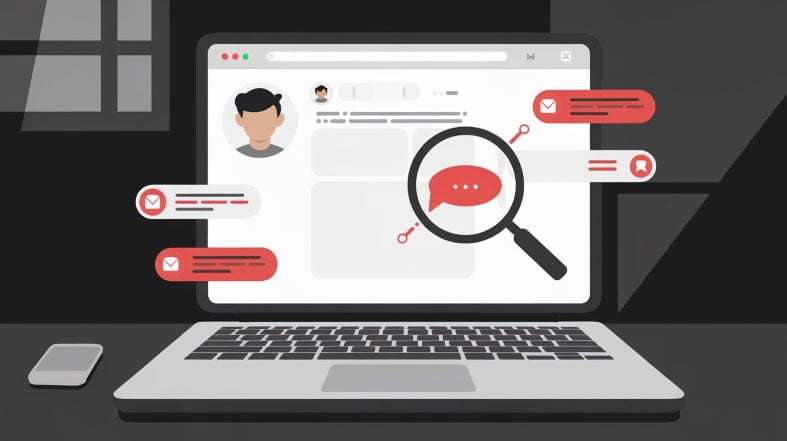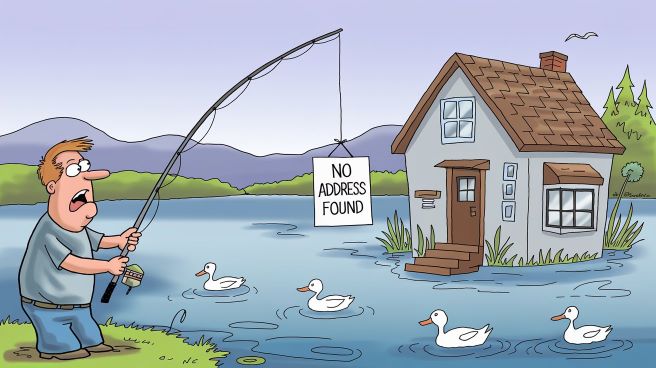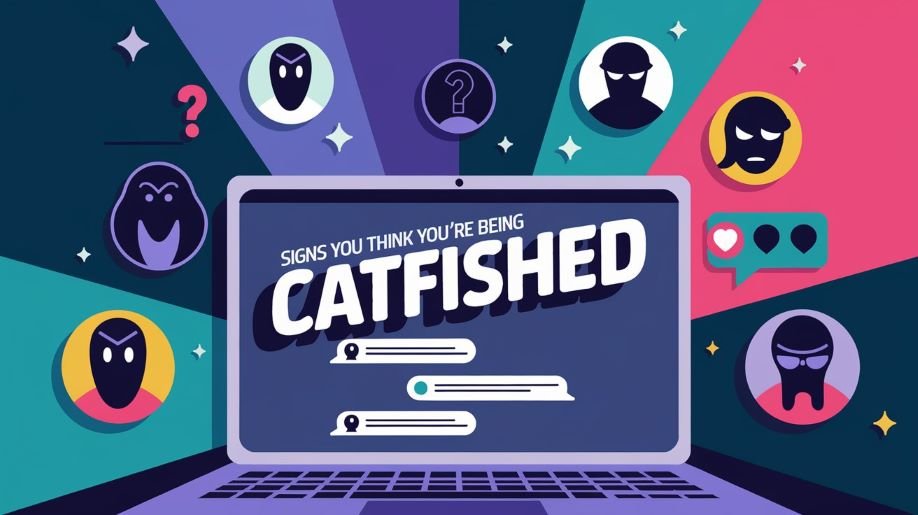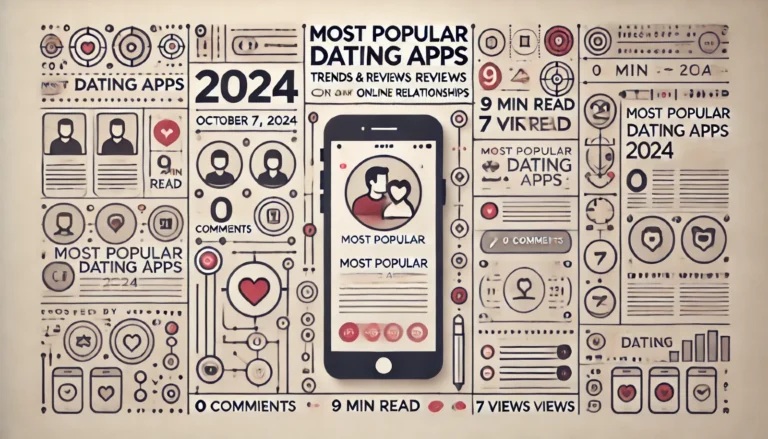We’ve all heard of being “catfished” or being misled on the internet by someone who’s created a fake profile in order to gain attention or deceive us into relationships, friendships, or business dealings. If you think you are being catfished or think a friend or family member is, please read on.
While initially, this term was used around 2005 about the MTV show Catfish featuring Nev Schulman, today it’s more pervasive than ever and can be extremely damaging; it’s estimated in the US alone, one in 10 online dating profiles are fake.
I’d like to point out that if you suspect someone is catfishing you, it’s already a strong indication that you might be right. It’s important to look for signs and gather proof to confirm their authenticity beyond a reasonable doubt.
For the love of money, don’t send anyone you don’t know. Check out our nightmare dates pledge for this, as often being catfished can lead to online scams.
What is Catfishing?

Catfishing is when someone creates a fake online identity to deceive others, often for personal gain, attention, or manipulation. This can happen on social media, dating apps, or even in online business dealings. Key warning signs of catfishing include long delays in responses, avoidance of video chats, inconsistent stories, or requests for money. Always be cautious if someone refuses to meet in person or provide real-time verification. If something feels off, trust your instincts and seek advice from a trusted third party to gain an objective perspective.
Warning Signs You’re Being Internet Catfished
- Too Good to Be True
- They have a profile picture of someone extremely attractive that seems out of place for casual online interactions.
- Reverse image searches may reveal that the pictures are stolen or used on multiple profiles or share a screenshot with a friend.
- Avoiding Video Calls or Face-to-Face Meetings
- They refuse to video chat or meet in person, often giving excuses like poor internet, being too shy, or needing to stay private for personal reasons.
- Inconsistent Stories
- Their backstory changes or doesn’t align with the information they shared earlier. This could be related to their job, location, or personal experiences.
- Requests for Money or Gifts
- They start asking for money, gift cards, or financial help, usually using emotional stories to manipulate you into sending funds.
- Hesitant to Provide Personal Details
- They avoid sharing personal information such as their full name, phone number, or social media profiles, making it difficult to verify who they really are.
- Fast Intimacy and Romance
- They rush into declaring love or deep emotions early on, even without meeting you in person, which can be a tactic to build trust and lower your guard.
- Dodging Specific Questions
- When you ask direct questions, they respond vaguely or avoid the subject entirely, often diverting attention away from their fake persona.
- Unreliable Communication
- There are long delays between their messages or they suddenly disappear for days, claiming personal or technical issues as excuses.
- Reluctance to Show Real-Time Proof
- They avoid sharing real-time photos or videos, instead sending staged or outdated content to maintain their facade.
- Too Many Compliments or Emotional Manipulation
They avoid sharing real-time photos or videos, instead sending staged or outdated content to maintain their facade.
Popular Scam jobs female catfish often have online
If you are speaking to a female online who has one of the following careers or jobs, then you should be extra vigilant because these are the occupations most used when people have been cheated or conned.
- 1) Stripper
- 2) Dancers of any kind
- 3) Model
- 4) Escort or Pro
- 5) Investor

Popular jobs men say they have to catfish people online
- 1) Working in the armed forces
- 2) Investor or banking
- 3) Working abroad for an oil company
- 4) Working abroad for a company that has had funds or equipment seized and needs money they promise to pay back
- 5) Police Officer or FBI
- 6) Doctor or Surgeon
If you want to learn more about why you have no matches on Tinder find out here.
Suspicious Photos and Profile Details
One of the most glaring signs that we might be dealing with a catfish is the presence of suspicious photos. When we come across a profile that features dazzling images, it’s crucial to remain vigilant. Often, these alluring profiles use images that are either stolen from other websites or are heavily edited.
For instance, a strikingly attractive individual might appear more like a magazine cover model than an everyday person, leading us to pause and ask ourselves why. Utilizing reverse image search tools such as Google Images can effectively reveal if these images have been used elsewhere, potentially flagging them as stolen and that someone is using a fake identity.
Too Good to Be True
We must exercise caution when encountering profiles featuring perfectly posed pictures. This typical trope signals that the person may not be genuine. Catfish frequently leverage professional headshots or even images from modelling sites to present themselves in a light that isn’t accurate.
I recall reading a user’s post on Reddit who chronicled their experience; they discovered multiple profiles using the exact same photographs, which led them to realize they weren’t just talking to one person but potentially dozens of unsuspecting victims. This serves as a powerful reminder that if a photo seems too good to be true, it probably is.
As we explore profile details further, another important red flag becomes evident.
Vague or Incomplete Information
When we analyze profiles closely, we should take note of vague or incomplete information juxtaposed with grand, elaborate stories about their lives. A lack of substantial personal details — such as who they are, what they do for a living, or where they’re located — paired with dramatic tales about how they ended up on the dating platform can be indicative of deception.
An authentic profile generally has consistency and depth; inferring too much from shallow accounts often points to someone hiding their true identity. It’s always worth cross-referencing information provided by the individual with what we glean from their photos and any other available data. Being discerning here can save us from emotional turmoil down the line.
Continuing this exploration into the nuances of online interactions reveals even more concerning signs that we need to scrutinize
- According to a 2019 survey by the Pew Research Centre, 15% of US adults have been victims of online romance scams, where someone pretends to be another person in order to gain a personal or financial gain.
- According to Match Group’s 2020 State of Dating in America report, one in seven American singles have been catfished – deceived by someone assuming a false identity online.
- A 2017 study published in Computers in Human Behaviour found that 30% of participants had experienced being catfished at least once and that men were more likely than women to be victims.
Never Meeting in Person
When someone we’ve formed a connection with consistently avoids meeting face-to-face despite opportunities arising, it should raise our suspicions about their authenticity. This concerning pattern can jeopardize our emotional well-being. While there might be legitimate reasons—like geographical distance or health issues—the frequency and creativity of their excuses should prompt us to pause and reassess our situation.
Endless Excuses
We might hear stories about other people’s seemingly trivial emergencies, but what happens when these stories start piling up? If our virtual partner constantly claims to be “travelling for work,” yet every time we try to arrange a meeting, they come up with last-minute cancellations, it’s worth scrutinizing further. At first, these explanations can feel reassuring, but as they repeat, they become increasingly suspicious. For instance, someone might claim a sudden family emergency just when we are supposed to finally meet. Such tactics are classic catfishing manoeuvres that can leave us feeling bewildered and frustrated.

In fact, I once heard from someone who repeatedly found themselves being stood up by a partner who was “always busy.” They were never able to verify any of the claims made by this supposed love interest, which ultimately raised doubts about the genuine nature of their relationship.
The inability or unwillingness to meet in person may also indicate a reluctance to reveal their true identity. It’s important to remember that building trust usually requires vulnerability from both sides. When one half remains shrouded in mystery, it raises questions about whether the connection is based on reality or a carefully crafted facade. Legitimate relationships flourish when both individuals are open and honest.
The Bigger Picture
To safeguard our emotions and overall safety, it’s vital to set clear boundaries and establish expectations early on in any online relationship. If meeting up feels important to us, we should communicate that desire clearly and observe how the other person responds. If they persistently resist with vague explanations or seem dismissive of our concerns, that’s a signal we cannot ignore.
By identifying these red flags early on, we can protect ourselves from potentially harmful situations and redirect our energy toward more meaningful interactions especially as we turn our attention to the significance of video communication in establishing trust and authenticity in online relationships.
Avoidance of Video Calls
Just as dodging in-person meetings can be alarming, repeatedly avoiding video calls serves as a significant warning sign that our new online acquaintances may not be who they claim to be. While technical glitches do happen, persistent rejection of video communication often points toward troubling intentions. We should remember that genuine connections thrive on open communication and visual interactions are a crucial part of that.
Technological Excuses
We might hear excuses about broken webcams or unreliable internet connections. While it’s entirely plausible for these issues to arise occasionally, when someone continually deflects requests for a video chat, we should approach the situation with caution. It’s essential to recognize that these technological hiccups shouldn’t linger indefinitely. If someone claims their equipment is malfunctioning but maintains an active online presence sharing photos and messages without hesitation the contradictions can become glaringly obvious.
According to recent surveys, 65% of individuals who avoided video calls were ultimately found to be concealing their true identity. This statistic illustrates how avoidance of direct visual communication often correlates with questionable motives.
In our experience, genuine people typically encourage meeting face-to-face or using video chats as part of the relationship-building process. They’ll want reassurance that we’re real too, which underscores the mutual pursuit of transparency in any meaningful interaction. When we meet up through screens, it adds layers of authenticity that text-based communication simply cannot.
Understanding these signs helps us fortify our defences against potentially deceptive situations. If our partner insists on maintaining this distance while readily engaging in everything but video calls, it could be time to reevaluate our connection with them. Seeking clarity through open dialogue may also empower us to ask why they are hesitant; for instance, “Why do you feel uncomfortable using video? Is there something you prefer to avoid?” A healthy relationship fosters curiosity and honesty.
Recognizing these behaviours is vital as we navigate the complexities of online relationships, especially when the conversation turns towards more sensitive requests.
Requesting Personal Information and Money
It’s crucial to recognize that many catfishers have a specific agenda: to extract personal information and financial help from unsuspecting victims. These requests often crop up once emotional intimacy has been established, as they gauge how much trust they’ve built before making their move. Our instincts might tell us something feels off, and it’s vital to listen to that inner voice.
Emotional Manipulation
Catfishers can be incredibly skilled in weaving detailed narratives that evoke sympathy. They might concoct elaborate tales filled with heart-wrenching scenarios—like a sudden illness or an imminent financial disaster that pressure us into feeling like we must act quickly to help them. This tactic exemplifies emotional manipulation, telling you things like their dad has cancer or his body needs to be moved as he has died are the worst I’ve heard.
They create urgency not just to elicit funds but also to foster a deeper emotional bond, which clouds our judgment. In essence, they trap us in a web of our own compassion.
We should remain vigilant about any story that seems too dramatic or conveniently timed. If we feel emotionally obligated to provide assistance, it’s worth taking a step back and evaluating the situation critically.
Financial Requests
Now, turning our attention to the requests for money, this is where red flags start waving vigorously. Legitimate relationships typically do not involve asking for financial support from someone we’ve never met face-to-face. If someone entreats us for cash under the guise of an emergency, this is a significant warning sign.
Additionally, shared personal details such as our home address, Date of Birth, or even banking information can become ammunition in the hands of malicious actors. It’s imperative that we safeguard our information, understanding that what may seem harmless could lead to identity theft or other forms of fraud.
| Red Flag | Percentage of Occurrence |
|---|---|
| Refusal of video calls | 65% |
| Never meeting in person | 50% |
| Requesting money | 40% |
Recognizing these signs is pivotal; it enables us to navigate online relationships with greater awareness and caution. By protecting ourselves against these manipulative tactics, we can engage in safer interactions online while preserving our emotional well-being and financial security.
In today’s digital world, vigilance and critical thinking are key when navigating online connections. Stay informed and trust your instincts.
Questions About You or Your Friends/Family/Person You’re Dating
In addition to detecting the signs that the person you’re talking to is not being honest in real life, it’s also important to evaluate their level of interest in you or your friends and family. Asking numerous questions in order to gain information that they can use against you is one of the most common tactics used by catfishes. It may come through as genuine curiosity, or they may be suspiciously seeking out too much personal information.
On the other hand, if you are dating someone online, it is understandable that they would want to learn more about the people close to you. They would want to understand your relationships better since those connections might have a huge influence on your life. However, there is a difference between forming a deeper connection with someone by learning about those ties and collecting information that could potentially be used against you. Pay attention to any red flag,s such as if their questions become more intrusive or if these topics make you uncomfortable.

No matter the situation, remember that being overly guarded can get in the way of meaningful conversations, so try your best to maintain a healthy balance – allow yourself to trust, but trust your gut as well. If you’re feeling uneasy about something, talk it over with someone else who can help provide an unbiased perspective before jumping into action. It’s important to take caution when engaging in online interactions while avoiding paranoia and staying open-minded.
Now that we understand how to spot warning signs that you are being catfished and evaluate how certain conversations may be a cause for concern, let’s move on to discussing what steps should be taken to protect ourselves and our information if we find ourselves in such situations.
How Common is Catfishing?
Catfishing has become alarmingly common in today’s digital landscape, affecting countless individuals across various online platforms. Studies indicate that nearly **one in five internet users** have encountered catfishing in some form, highlighting the widespread nature of this deceitful practice. Interestingly, research suggests that the rise of social media and online dating apps has contributed significantly to this trend, as these platforms provide fertile ground for individuals seeking to create false identities.
Furthermore, it’s important to acknowledge that while catfishing often garners attention for its more sensational aspects, it also taps into deeper psychological issues, including loneliness and the desire for acceptance. As we navigate this complex online environment, understanding the prevalence and impact of catfishing is crucial for cultivating a sense of caution and awareness. By recognizing how common this phenomenon is, we can better equip ourselves to identify red flags and protect our emotional and financial well-being in our online interactions. Signs you think You’re Being Catfished
What to Do If You Are Getting Catfished
If you find yourself being a victim of catfishing, the first step is to take a step back and assess the situation. You may have already experienced some of the warning signs discussed earlier, such as suspicious questions about your life or friends/family/person you’re dating, but it’s important to be mindful of all aspects of your relationship in order to take action.
Many victims of catfishing become so fixated on the idea of creating a meaningful connection with someone that they ignore their own red flags. They might tell themselves that the other person is just shy or trying to take their time getting to know them. But by recognising when something strange is happening, you can react in the most effective way possible.
The most effective next step to take if you are being catfished is to stop engaging with the individual in question and cut off contact as soon as possible. Nothing good will come out of continuing a conversation with someone who has lied about their true identity. If you don’t disengage from them, there’s always a chance that your conversations could lead to something more serious and dangerous, such as blackmail or stalking.
It may also be beneficial to report the catfish to social media sites or law enforcement authorities if you feel it is necessary. This should be done only after all attempts have been made to distance yourself from the situation, but can help bring justice to those behind these schemes and potentially prevent others from experiencing similar ordeals in the future.
Finally, don’t forget to take care of yourself both emotionally and physically after an experience like this one. The aftermath can often leave victims feeling embarrassed, hurt and violated so it’s important to talk about your experiences with someone you trust and learn how to better protect yourself in the future by setting appropriate boundaries when interacting with strangers online.
Master the art of navigating dating challenges with our expert guide on ‘Dealing with Difficult Situations in Dating: Expert Advice and Strategies

Responses to Frequently Asked Questions
Why do people pretend to be someone else online and are catfishing others?
People catfish for many reasons. Some do it out of boredom, to seek attention, while others have darker intentions like scamming victims for money or personal information. Unfortunately, there’s little legal consequence for this behaviour unless serious harm is caused.
Are there any common warning signs of being catfished?
Yes. Major red flags include overly perfect profiles, avoiding video chats or meetings, quickly expressing love, and asking for money. Always be cautious of inconsistent stories and sudden financial requests.
How do I know if I’m being catfished?
If the person you’re talking to avoids video chats, frequently changes their story, or asks for money, you might be dealing with a catfish. Trust your instincts and verify information where possible. If it feels off, it probably is.
What do I do if I suspect that I’m being catfished?
First, stop communicating and assess the situation. Avoid giving out personal details if they continue to ask for money or dodge meeting in person; disengage and block them. Reporting the catfish to the platform or authorities can help prevent others from being scammed.
Are there any websites I can use that don’t have Catfish?
No, sadly not, if a website has a facility for chats or posting images, then they will have people trying to fake or scam people.
Their phone number seems real as it has the same area code and country code How can they be fake?
Yes. Scammers can use virtual numbers from any location to make it appear they are local. A local number does not guarantee authenticity.
If I catfish someone, does that make me a bad person?
Yes. Catfishing is a form of deception, and no positive outcome comes from lying about your identity. If you’re doing this, it’s important to seek help to address underlying issues.
Has catfishing ever turned out to be good or turned into a real romance?
On Catfish, the program rarely, in real life never, to start a relationship based on lies is never going to work if someone is catfishing you, it’s not going to turn into a romance if you confide that you know what they are doing.
Do people who catfish others ever admit it?
Rarely. When caught, most catfishers block their victims or become abusive. Admission of guilt is uncommon.
Who creates fake profiles on social media sites?
People who catfish often create new email addresses or buy fake accounts in bulk, uploading stolen images to make their profiles seem real.
How do I prove I am not being catfished?
Ask for a live video chat or photos with a specific request, like having them hold up a sign. Scammers often avoid real-time verification or make excuses.
I do not want to accept I am being catfished and believe the person is real
It’s common to feel denial when you’re being manipulated. Take a step back and assess the facts logically. Share your concerns with a trusted friend for an unbiased opinion.
Should I send money to my friend online who says he needs it?
Never send money to someone you’ve only met online. Scammers often use emotional manipulation to request funds. If they ask for money, it’s a huge red flag.
What are some of the ways to avoid being catfished?
Be cautious when talking to people online. Look for warning signs like requests for money, inconsistent stories, or avoidance of live video chats. Always verify the person’s identity before getting emotionally involved.
Are some of the people who catfish sick or suffering from mental illness?
Some may have underlying mental health issues, but catfishing is primarily a deceptive and harmful behaviour. Regardless of the motive, it’s wrong and causes emotional harm.







Leave a Comment